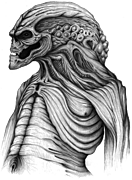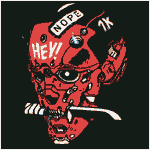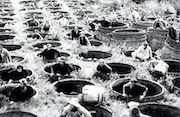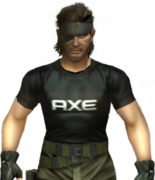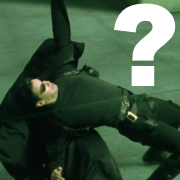|
I was thinking more of all the grappling moves going on, the Eureka vs Mutavore fight being a key example.
|
|
|
|

|
| # ? Apr 27, 2024 22:28 |
|
Rocket Punch would be a good name for a finishing move.
|
|
|
|
Maxwell Lord posted:Even though authorial intent doesn't matter etc., I think the words of Del Toro on the subject of the kaiju and how villainous they are do provide some insight. This is from the same Birth. Movies. Death. issue I quoted before. Del Toro contradicts himself here, in a telling way. He says that a (good) kaiju film works like a wrestling match, with both the good and evil monsters displaying clear and entertaining personalities. He then says that the monsters in Pacific Rim are neither good nor evil, being just kind of generically 'there', like nature. Also, aesthetically, there's a clear contrast between the (dark, rainy) look of Pacific Rim and the style of lighting Barthes praised in theatrical wrestling: "what makes the circus or the arena what they are is [...] the drenching and vertical quality of the flood of light. Even hidden in the most squalid Parisian halls, wrestling partakes of the nature of the great solar spectacles, Greek drama and bullfights: in both, a light without shadow generates an emotion without reserve." This obviously describes more the 'daylight' (soundstage) battles at the end of Gamera: Guardian of the Universe, Legend of Dinosaurs and Monster Birds, or even Jurassic Park, than any scene in Pacific Rim. Not to mention any of Honda's later kaiju films! And the fights themselves: "[It is] in the body of the wrestler that we find the first key to the contest. I know from the start that all of Thauvin's actions, his treacheries, cruelties and acts of cowardice, will not fail to measure up to the first image of ignobility he gave me; I can trust him to carry out intelligently and to the last detail all the gestures of a kind of amorphous baseness, and thus fill to the brim the image of the most repugnant bastard there is: the bastard-octopus. [...] The physique of the wrestlers therefore constitutes a basic sign, which like a seed contains the whole fight. But this seed proliferates, for it is at every turn during the fight, in each new situation, that the body of the wrestler casts to the public the magical entertainment of a temperament which finds its natural expression in a gesture. The different strata of meaning throw light on each other, and form the most intelligible of spectacles. Wrestling is like a diacritic writing: above the fundamental meaning of his body, the wrestler arranges comments which are episodic but always opportune, and constantly help the reading of the fight by means of gestures, attitudes and mimicry which make the intention utterly obvious. Sometimes the wrestler triumphs with a repulsive sneer while kneeling on the good sportsman; sometimes he gives the crowd a conceited smile which forebodes an early revenge; sometimes, pinned to the ground, he hits the floor ostentatiously to make evident to all the intolerable nature of his situation; and sometimes he erects a complicated set of signs meant to make the public understand that he legitimately personifies the ever- entertaining image of the grumbler, endlessly confabulating about his displeasure. We are therefore dealing with a real Human Comedy, where the most socially-inspired nuances of passion (conceit, rightfulness, refined cruelty, a sense of 'paying one's debts') always felicitously find the clearest sign which can receive them, express them and triumphantly carry them to the confines of the hall." (Barthes) Pacific Rim clearly lacks these different strata of meaning, making the battels unintelligible outside of first impressions of the bodies of the creatures (hence the toychat). There's no part where the monster sneers with disgust at the robot that vexes it, squeals with glee, or any other clear gesture of the sort. In fact, when not just attacking in a straight line, the monsters gently prod their surroundings ambiguously. Their intentions are not clear at all, despite what the expository dialogue is telling us. As a huge, 'fat bitch' monster, shouldn't we see Leatherback lustily devouring the city (for example)? In Gamera 1, the Gyaos tears open a train car like a sardine can to feast on the occupants. It just eats messily - slurping sounds, gore dripping from its face. This is what I mean when I say Gyaos is a truly hateful bastard of a monster. We don't see a single civilian death in the entirety of Pacific Rim. It's not enough to understand the kaiju as a hurricane; we need to loathe them and enjoy loathing them. And you simply can't loathe a tornado. Loathing is intensely personal, and passionate, but rimmers dispassionately endorse the rational necessity of doing something to stop a weather thing. The same applies to Mako: she is a 'deep character' in the sense that we look 'deeply' into her brain to see that she likes Zen and whatever. But in terms of actually displaying her characteristics, she stands around demurely before yelling once in the extremely atypical (actually good) sword scene. Hero Guy's even worse, since he doesn't really display any passionate, grandiloquent gestures after the scene on the beach. In that part, he displays exaggerated suffering and disorientation. Why never again? SuperMechagodzilla fucked around with this message at 06:10 on Aug 26, 2013 |
|
|
|
SuperMechagodzilla posted:In 2000, the 100th anniversary of the publication of Freud’s The Interpretation of Dreams was accompanied by a new wave of triumphalist acclamations of how psychoanalysis is dead: with the new advances in brain sciences, it is finally put where it belonged all the time, to the lumber-room of pre-scientific obscurantist search for hidden meanings, alongside religious confessors and dream-readers. As Todd Dufresne put it, no figure in the history of human thought was more wrong about all its fundamentals - with the exception of Marx, some would add. And, effectively and predictably, in 2005, the infamous The Black Book of Communism, listing all the Communist crimes, was followed by The Black Book of Psychoanalysis, listing all the theoretical mistakes and clinical frauds of psychoanalysis. In this negative way, at least, the profound solidarity of Marxism and psychoanalysis is now displayed for all to see. So Marxism and Psychoanalysis are related, because books about them were released within several years of each other. Anyway, one of the most recognizable symptoms of schizophrenia is overactive pattern recognition, resulting in the patient seeing connections and significance that don't exist. SuperMechagodzilla posted:There is something to this funeral oratory. A century ago, in order to situate his discovery of the unconscious in the history of modern Europe, Freud developed the idea of three successive humiliations of man, the three “narcissistic illnesses,” as he called them. First, Copernicus demonstrated that Earth turns around the Sun and thus deprived us, humans, of the central place in the universe. Then, Darwin demonstrated our origin from blind evolution, thereby depriving us of the privileged place among living beings. Finally, when Freud himself rendered visible the predominant role of the unconscious in psychic processes, it became clear that our ego is not even a master in his own house. Today, a hundred years later, a more extreme picture is emerging: the latest scientific breakthroughs seem to add a whole series of further humiliations to the narcissistic image of man: our mind itself is merely a computing machine for data-processing, our sense of freedom and autonomy is merely the user’s illusion of this machine. Consequently, with regard to today’s brain sciences, psychoanalysis itself, far from being subversive, rather seems to belong to the traditional humanist field threatened by the latest humiliations. So psychoanalysis, which renders every subject as a robot with no agency struggling to tamp down its sex protocol, is humanistic? SuperMechagodzilla posted:Lacan started his “return to Freud” with the linguistic reading of the entire psychoanalytic edifice, encapsulated by what is perhaps his single best known formula: “the unconscious is structured as a language.” The predominant perception of the unconscious is that it is the domain of irrational drives, something opposed to the rational conscious self. For Lacan, this notion of the unconscious belongs to the Romantic Lebensphilosophie (philosophy of life) and has nothing to do with Freud. The Freudian unconscious caused such a scandal not because of the claim that the rational self is subordinated to the much vaster domain of blind irrational instincts, but because it demonstrated how the unconscious itself obeys its own grammar and logic – the unconscious talks and thinks. The unconscious is not the reservoir of wild drives that has to be conquered by the ego, but the site where a traumatic truth speaks. Therein resides Lacan’s version of Freud’s motto wo es war, soll ich werden (where it was, I shall become): not “the ego should conquer the id”, the site of the unconscious drives, but “I should dare to approach the site of my truth”. What awaits me “there” is not a deep Truth I have to identify with, but an unbearable truth I have to learn to live with. Neurologically, one similarity in patients with schizophrenia is a disrupted or impoverished prefrontal and medial cortex. This makes it difficult for the forebrain to communicate with the hindbrain, which in turn makes them see their own "deep" emotions as "unbearable" or "mystifying." SuperMechagodzilla posted:How, then, do Lacan’s ideas differ from the mainstream psychoanalytical schools of thought and from Freud himself? With regard to other schools, the first thing that strikes the eye is the philosophical tenor of Lacan’s theory. For Lacan, psychoanalysis at its most fundamental is not a theory and technique of treating psychic disturbances, but a theory and practice which confronts individuals with the most radical dimension of human existence. It does not show an individual the way to accommodate him- or herself to the demands of social reality; it explains how something like “reality” constitutes itself in the first place. It does not merely enable a human being to accept the repressed truth about him- or herself; it explains how the dimension of truth emerges in human reality. In Lacan’s view, pathological formations like neuroses, psychoses and perversions, have the dignity of fundamental philosophical attitudes towards reality. When I suffer obsessional neurosis, this ‘illness’ colours my entire relationship to reality and defines the global structure of my personality. Lacan’s main critique of other psychoanalytic orientations concerns their clinical orientation: for Lacan, the goal of psychoanalytic treatment is not the patient’s well-being or successful social life or personal self-fulfilment, but to bring the patient to confront the elementary coordinates and deadlocks of his or her desire. Lol, so the ONE thing Lacan doesn't like about psychoanalysis is that it could conceivably help patients be happy? SuperMechagodzilla posted:Lacan’s “return to Freud” provided a new theoretical foundation of psychoanalysis with immense consequences also for analytic clinic. Controversy, crisis, scandal even, accompanied Lacan throughout his path. Not only was he, in 1953, excommunicated from the International Psycho-Analytic Association (see his Chronology) but his provocative ideas disturbed many progressive thinkers, from critical Marxists to feminists. Although, in the Western academia, Lacan is usually perceived as one of the postmodernists or deconstructionists, he clearly sticks out from the space designated by these labels. All his life, he was outgrowing labels attached to his name: phenomenologist, Hegelian, Heideggerian, structuralist, poststructuralist; no wonder, since the most outstanding feature of his teaching is permanent self-questioning. In conclusion, you and Slavoj Žižek are, collectively, the dumbest fag alive. What a Koos fucked around with this message at 07:01 on Aug 26, 2013 |
|
|
SuperMechagodzilla posted:The imagery of things crawling in and out of fleshy slits recurs constantly. I didn't pick up much symbolism in Pacifc Rim. But I did notice that when Del Toro made Blade 2 he added very elaborate vaginal monsters to the franchise. Please ignore the Harry Knowles review where he talks about how this means Del Toro is eating pussy. Honestly, my problem with Pacific Rim was that it didn't have much subtext or even gorgeous text compared to Del Toro's other films. It was 2 hours of action figures smashing into each other - which, judging by the first 50 pages in this thread, is exactly what manchildren want in a film. Compare that to Upstream Color, The World's End and Elysium (which I haven't seem), which at least try and make the sci-Fi mean something.
|
|
|
|
SuperMechagodzilla posted:Pacific Rim clearly lacks these different strata of meaning, making the battels unintelligible outside of first impressions of the bodies of the creatures (hence the toychat). There's no part where the monster sneers with disgust at the robot that vexes it, squeals with glee, or any other clear gesture of the sort. In fact, when not just attacking in a straight line, the monsters gently prod their surroundings ambiguously. Their intentions are not clear at all, despite what the expository dialogue is telling us. EXACTLY! I'm not sure how people in this thread are differentiating the Kaiju. They had no personality or even much visual difference. I can recognize classic Tobo kaiju from toys I saw 20 years ago.
|
|
|
|
|
I'm gonna actually strike up the position of Devil's Advocate here, and bring up this: What if the different kaiju being without individual personality besides their appearances and powers was completely intentional? They are mass-produced, hive-mind, biological weapons. I wouldn't expect them to have individual thoughts and personalities any more than I would expect a giant killer worker bee to have a different personality from a giant worker ant with an EMP on its back. Different methods, definitely. Different personalities? No, not really.
|
|
|
|
Count Chocula posted:EXACTLY! I'm not sure how people in this thread are differentiating the Kaiju. They had no personality or even much visual difference. I can recognize classic Tobo kaiju from toys I saw 20 years ago. Leatherback - A large, lumbering ape-like creature with some kind of crown or fins on its face, along which runs several relatively small eyes, and has a mess of blue 'hair' that moves like something out of a reef. Of course, has the EMP weapon in its back, and is somewhat standoff-ish - it takes a few moments to scream before its charge at Gipsy Danger in the moments preceding the elbow, and getting a faceful of cargo containers, roars back in defiance. Seems to have a degree of tool use, as on falling back from the elbow rocket, it wrenches a nearby crane from the ground and proceeds to use it like a hammer. Otachi - More lizard-like, a slender figure with a long tail, with horns on its snout and two predominantly large eyes. Seems somewhat nimble, as it attempts to rear back and dodge Crimson Typhoon's buzzsaw attack, with somewhat mixed success. Has an almost Frieza-esque habit of revealing new tricks that could potentially spell a Jaeger's doom, like its tail being able to rip Crimson Typhoon's head off, the acid spit, and of course the wings it uses to try and lift Gipsy Danger up into the upper atmosphere. Seems to be a 'Hunter' amongst the Kaiju, as it quickly heads off to track down Newt when no longer occupied, and not caring for how much of the city it smashes up in the process; it also uses the large landscape to hide itself in the midst of its fight with Gipsy Danger, before which, it did rather quickly identify the bot as a threat. Also stronger than it looks, as it not only lifts Gipsy up, but plows it right through a building. Knifehead - Has the big old point on its head, and several small eyes to go with it, plus a gaping mouth with various little outward pointing teeth. Compared to others, Knifehead seems more to try and rip apart or actually feed on its opponents, as its either stabs Gipsy with its head or, particularly as it emerged from the waters very much still alive, and clamps down its teeth on the arm. Unlike the others, doesn't seem specifically out to counteract the Jaegers as such - it honestly seems more to kill Yancy by accident than anything else, and just tries to tear Gipsy Danger apart in general as its pinned to the ice. Slattern - Almost a Y-shaped head, with two main eyes and three large tails that coil behind it. Large and powerful body, and very much has its tail as part of its arsenal, as it lashes out against Striker Eureka after letting them spin a bit, and repeatedly stabs them into Gipsy Danger's back as they freefall towards the breach. Main characteristic seems to simple persistence, as it takes the most powerful nuke ever created to the face and still tries to pick a fight, and again, keeps trying to stab Gipsy with its tails even as the Jaeger burns through it with its chest blaster. Trespasser and Mutavore - This is where the distinctions do break down somewhat, as both are axe-headed, multi-armed Kaiju whose scenes involve walking right through something (the Golden Gate bridge and the anti-kaiju wall respectively). The big difference is really in body size, as Trespasser is quite large and round, and Mutavore is somewhat thinner. Scunner and Raiju - Where the distinction lies more in artwork than in the actual film. Both are, after all, treated as high speed, underwater kaiju that respond to Slattern like a couple of mooks. Raiju is actually meant to look like basically a giant crocodile or alligator, and Scunner like the hammerhead to Knifehead's goblin shark. Raiju's habit of charging winds up being its downfall as, in ripping off Gipsy Danger's arm, it winds up cutting itself in half as its momentum carries it across Gipsy Danger's blade. Scunner'll be best remembered as the Kaiju that got half its face melted over a volcanic vent, and being the intended corpse to use to get through the breach until Slattern reared its smoking and likely now nuclear head. The big problems in terms of distinguishing the Kaiju are: A) The fact that the names are mentioned once, which after the Knifehead fight, makes it more than a bit annoying trying to pin down which monster is which since there's always more than one Kaiju in a fight. And only Leatherback is mildly obvious. B) There is a definite lack of colour distinction. I get Del Toro was trying to make 'blue' their colour and keep 'em vaguely consistent with each other, but the Karloff Kaiju, mainly featured in the comic, is much more distinct and easy to remember because its red and white, so it sticks out.
|
|
|
|
Count Chocula posted:manchildren You're Count Chocula.
|
|
|
|
The Leper Colon V posted:I'm gonna actually strike up the position of Devil's Advocate here, and bring up this: Well it probably is intentional judging from the interview excerpt up there. It fits the plot perfectly, but that doesn't make it good. It's a misstep.
|
|
|
|
The Leper Colon V posted:I'm gonna actually strike up the position of Devil's Advocate here, and bring up this: Even in Them!, where the antagonists are literally ants (and also fairly rigid puppets), you linger on the destruction - you see homes literally torn apart, ants building a mountain of human bones... in one scene, the protagonist examines a site of destruction and is baffled that whoever did it left the money behind. At the same time, the ants are rigorously compared to the humans - so that the darker side of the protagonists' actions serve as ant characterization in a roundabout way. The humans are at constant risk of becoming ants. Pacific Rim kinda halfheartedly achieves the latter ("to fight monsters blah blah blah), but certainly not the former.
|
|
|
|
This is great and all but why is rocket punch?
|
|
|
|
Poniard posted:This is great and all but why is rocket punch? Rockets are super phallic of course, in both the physical and symbolic senses.
|
|
|
|
Here's the thing - any good movie works on both the 'literal' (whatever the tuck that means) level and various levels of symbolism, meaning, etc. The best movies invite constant discussion and critique. And I'm not talking about high-brow art films here - most horror movies invite this sort of thing. Pacific Rim just felt so empty of all that that when I saw the movie I enjoyed it, but it didn't stick with me on any level. And it was such a loud movie that I'm loath to see it again in theaters. It's odd, since Del Toro is such a smart filmmaker, so I'm probably the one missing something. I do like the idea of seeing a movie as just a disconnected series of strange images, and in that case the plot is the first thing you strip out. Usually symbolic/primal images are still there. Hell there were periods of history where all art was allegory. I'd love if posters like SMG could come into the Upstream Color, World's End and Beyond the Black Rainbow threads to help us tease out the meanings in those movies, which demand a higher level film vocabulary than I have.
|
|
|
|
|
Count Chocula posted:Hell there were periods of history where all art was allegory. Well, it was pretty hard to have a stated meaning in a work of art in times where being able to read was like having superpowers. e: Or there's the Soviet sci-fi example where allegory was the only way they could find to publicly criticize the regime without being punished for it.
|
|
|
|
A Dirty Sock posted:Rockets are super phallic of course, in both the physical and symbolic senses. While the above is true, the fist is actually a pre-phallic partial object, and 'punching' is an asexual, goal-oriented activity. In yelling the name of the move, however, the emphasis is obviously not on the goal but on the gesture itself. (Does 'rocket punching' even really bother the kaiju? Does anyone care?) That move beyond the plain functionality of the gesture lends it an obscene subtext. Rocket-punching is not just the combination of fist and phallus but the fist replacing the phallus. "And, to go even a step further, is the practice of fist-loving not the exemplary case of what Deleuze called the "expansion of a concept?" The fist is put to a new use; the notion of penetration is expanded into the combination of the hand with sexual penetration, into the exploration of the inside of a body. No wonder Foucault, Deleuze's Other, was practicing fisting: is fist-loving not the sexual invention of the twentieth century, a new model of eroticism and pleasure? It is no longer genitalized, but focused just on the penetration of the surface, with the role of the phallus being taken over by the hand, the autonomized partial object par excellence. And, what about the so-called Transformer or animorph toys, a car or a plane that can be transformed into a humanoid robot, an animal that can be morphed into a human or robot. Is this not Deleuzian? There are no "metaphorics" here; the point is not that the machinic or animal form is revealed as a mask containing a human shape but, rather, the existence of the becoming-machine or becoming-animal of the human, the flow of continuous morphing. What is blurred here is also the divide machine/living organism: a car transmutes into a humanoid/cyborg organism. And, is the ultimate irony not that, for Deleuze, the sport was surfing, a Californian sport par excellence if there ever was one? No longer a sport of self-control and domination directed towards some goal, it is just a practice of inserting oneself into a wave and letting oneself be carried by it. Brian Massumi formulated clearly this deadlock, which is based on the fact that today's capitalism already overcame the logic of totalizing normality and adopted the logic of the erratic excess..."
|
|
|
|
SuperMechagodzilla posted:While the above is true, the fist is actually a pre-phallic partial object, and 'punching' is an asexual, goal-oriented activity.
|
|
|
|
Slavoj Žižek
|
|
|
|
Count Chocula posted:I'd love if posters like SMG could come into the Upstream Color, World's End and Beyond the Black Rainbow threads to help us tease out the meanings in those movies, which demand a higher level film vocabulary than I have. World's End has its thesis literally written in 7 foot high letters in plain english behind Nick Frost's character during the ending sequence, and you can't puzzle it out without SMG vomiting Zizek all over that also bad thread?
|
|
|
|
SuperMechagodzilla posted:While the above is true, the fist is actually a pre-phallic partial object, and 'punching' is an asexual, goal-oriented activity. Does Zizek ever, like, stop for even a moment to check his facts before he makes one his central point? There's recorded erotic imagery of fisting dating as far back ancient India, and I'm pretty sure people do it because it feels good, not because 20th century Po-Mo brain melting.
|
|
|
|
Saw the novelization of the movie at the local book franchise store the other day. I enjoyed the movie and was kind of curious if the book expands on it at all or if it's worth the read? Do we get more Cherno Alpha and Crimson Typhoon? Or is it just laced with super phallic imagery?
|
|
|
|
SuperMechagodzilla posted:While the above is true, the fist is actually a pre-phallic partial object, and 'punching' is an asexual, goal-oriented activity. I've always struggled with interpreting Deleuze via Zizek because it seems Zizek (purposefully?) misreads him. Admittedly, I used his Organs Without Bodies earlier to make a point as well, however Zizek's concept of becoming-machine is, to my knowledge, his own as Deleuze never introduced such a specific concept. Granted, from what I gather that is Zizek's point (that Deleuze's worth comes from those parts that Zizek can plainly call Hegelian). I dunno, I need to finish OwB. Danger fucked around with this message at 15:45 on Aug 27, 2013 |
|
|
|
AndyElusive posted:Saw the novelization of the movie at the local book franchise store the other day. It's worth the read, but explaining the extra stuff you get from reading it would basically spoil it for you. You don't really get more Cherno and Typhoon, so much as more details of what was actually going on in that fight that may not be clear if you only saw the movie once. You do get pages of information on each Jaeger and their histories, and it looks like there was a side plot at one point about the Jaegers having some "ghost in the machine" type properties to them linking them to their pilots once a Drift was successful (they seem to have their own personalities that are influenced by the drifting pilots), but none of that was in the film itself.
|
|
|
|
Pacific Rim - Not interesting and shallow and for manchildren but gets hundreds of pages and paragraphs anyway
|
|
|
|
A Steampunk Gent posted:Does Zizek ever, like, stop for even a moment to check his facts before he makes one his central point? There's recorded erotic imagery of fisting dating as far back ancient India, and I'm pretty sure people do it because it feels good, not because 20th century Po-Mo brain melting. I liked SMG's posts a lot better when he wasn't constantly name-dropping Zizek, and quote-mining him to the point of self-parody, with the odd break to sneer at toychat and bait people with one-liners. Pacfic Rim's greatest crime is that it got SMG into a terrible rut.
|
|
|
|
But he's been doing all of those things for the past 3 years at least??
|
|
|
|
A Steampunk Gent posted:Does Zizek ever, like, stop for even a moment to check his facts before he makes one his central point? There's recorded erotic imagery of fisting dating as far back ancient India, and I'm pretty sure people do it because it feels good, not because 20th century Po-Mo brain melting. You should have realised your mistake when you put "facts" and "po-mo" in the same post.
|
|
|
|
Bonaventure posted:But he's been doing all of those things for the past 3 years at least?? Well, he's obviously a disciple of Zizek but I don't recall him making as many direct quotes.
|
|
|
|
RBX posted:Pacific Rim - Not interesting and shallow and for manchildren but gets hundreds of pages and paragraphs anyway Exactly, yes.
|
|
|
|
I'm a strong supporter of Post-Structuralist reading and generally agree with the points SMG makes towards the film and the discussion of in it within this thread, but what the gently caress is thisSuperMechagodzilla posted:
So as we've already established, Zizek was talking out his arse w/r/t fisting and I have no idea how it could be linked in any way specific to 20th century attitudes or consciousness, it's a sex thing people do because sex, but his description of surfing is equally nonsensical and weasely. Has Zizek ever tried surfing? It's loving hard and requires a lot of self control and mastery of the body, it isn't a team sport and doesn't have the same agressive mentalality as traditionally macho sports like American Football or Lacrosse, but then neither does cycling or rock climbing. Does rock climbing also adopt 'the logic of erratic excess'? And what is erratic excess in this context anyway? SMG, do you actually think anyone without a background in Postmodern academia can actually make heads or tails of this? If not, why did you post it? Which brings me to my second point, which is I have no idea whatsoever this paragraph is trying to say, maybe there is actually a really smart point about becoming-machine/becoming-animal and how it relates to capitalist domination of reality, but it's written in such a rambling, eosteric style making repeated off-hand references to an entire canon of philosophers talking about concepts unfamiliar to almost everyone outside of the very insular, bourgeoisie world of academia that it's pratically worthless for a lay-person to even try and begin to broach his work. How can this be reconciled with his self-proclaimed Marxism? Should workers who want to understand his analysis of capitalist culture and etc really have to butt their heads against his textual brick wall or (somehow) undertake an entire field of study just to have a grounding in what he's saying? (Just to clarify, I don't consider Zizek to be a lone offender in this, I tried to read Judith Butler's Gender Trouble off the back of Rki's Wilchkin's Queer Theory, Gender Theory only be to completely overwhelmed by the suffocating density of the text, Postmodern authors in general just don't seem to consider the victims of the subjects of their critiques to be worth any special consideration when writing.)
|
|
|
|
A Steampunk Gent posted:I'm a strong supporter of Post-Structuralist reading and generally agree with the points SMG makes towards the film and the discussion of in it within this thread, but what the gently caress is this "the more varied, and even erratic, the better. Normalcy starts to lose its hold. The regularities start to loosen. This loosening of normalcy is part of capitalism's dynamic. It's not a simple liberation. It's capitalism's own form of power. It's no longer disciplinary institutional power that defines everything, it's capitalism's power to produce variety–because markets get saturated. Produce variety and you produce a niche market. The oddest of affective tendencies are okay–as long as they pay. Capitalism starts intensifying or diversifying affect, but only in order to extract surplus-value. It hijacks affect in order to intensify profit potential. It literally valorises affect. The capitalist logic of surplus-value production starts to take over the relational field that is also the domain of political ecology, the ethical field of resistance to identity and predictable paths. It's very troubling and confusing, because it seems to me that there's been a certain kind of convergence between the dynamic of capitalist power and the dynamic of resistance." The connection to Pacific Rim isn't, then, necessarily tenuous; if (as A Dirty Sock correctly posited) the rocket is inherently phallic then the event of rocket punching articulated by a man/machine/monster is necessarily Deleuzian (an erratic or subversive process of difference, a becoming). The problem, at times, with Zizek's identification of Deleuzoguattarian mumbojumbo is that he he uses the concepts to articulate his own concepts which seem almost like a retreat from Deleuze's approach. He comes at Deleuze from a Hegelian perspective which is pretty opposite of Deleuze's work (from how I understand it at least, but it's really been a while since I read any). I'm not saying that this is a fault of Zizek, as his points regarding post-ideological capitalism are at least plainly articulated, but that sometimes I'm not sure how/why he is referring to Deleuze. But like I said, I need to reread his critique a few more times to make better sense of it. quote:Which brings me to my second point, which is I have no idea whatsoever this paragraph is trying to say, maybe there is actually a really smart point about becoming-machine/becoming-animal and how it relates to capitalist domination of reality, but it's written in such a rambling, eosteric style making repeated off-hand references to an entire canon of philosophers talking about concepts unfamiliar to almost everyone outside of the very insular, bourgeoisie world of academia that it's pratically worthless for a lay-person to even try and begin to broach his work. How can this be reconciled with his self-proclaimed Marxism? Should workers who want to understand his analysis of capitalist culture and etc really have to butt their heads against his textual brick wall or (somehow) undertake an entire field of study just to have a grounding in what he's saying? (Just to clarify, I don't consider Zizek to be a lone offender in this, I tried to read Judith Butler's Gender Trouble off the back of Rki's Wilchkin's Queer Theory, Gender Theory only be to completely overwhelmed by the suffocating density of the text, Postmodern authors in general just don't seem to consider the victims of the subjects of their critiques to be worth any special consideration when writing.) Zizek's in depth scholarly critique probably isn't the best to just jump right into, but it is still reflective of his views which can easily enough be related conceptually to points in the film. He has also written plenty that is much more accessible. I don't think Zizek would claim they have to do anything, but places extreme importance on the value of theory to radical action. In his own words: quote:What is crucial and also I think—especially today, when we have some kind of re-emergence of at least some kind of practical spirit, protest, and so on—one of the dangers I see amongst some radical academia circles is this mistrust in theory, you know, saying, “Who needs fat books on Hegel and logic? My god, they have to act!” Also, referring back to the threads repeated pleas, there a multitude of different interests and avenues of discussion; but you can't be surprised that elements of film theory (of which Deleuze, Zizek, Kristeva, etc. hold large estates) would pop up in on the film discussion board. Also, as repeatedly pointed out, every aspect that you can approach the film (and especially from the marketing/commodification aspect) are elements of ideology that many consider important to unpack.
|
|
|
|
Look, I just want to know which of the four robots punches hardest. Also, what if one of them had a flamethrower but the kaiju kept fighting even though it was on fire?
|
|
|
Hanks Lust Cafe posted:Look, I just want to know which of the four robots punches hardest. Also, what if one of them had a flamethrower but the kaiju kept fighting even though it was on fire? I believe the first would be Cherno Alpha because A jaeger-size flamethrower would be wicked but (according to the novel) kaiju are silicon-based so they'd probably, like, melt or something rather than be all
|
|
|
|
|
Clipperton posted:I believe the first would be Cherno Alpha because Cherno Alpha has Incinerator Turbines alongside the Tesla Fists and Earth Spikes.
|
|
|
|
A Steampunk Gent posted:So as we've already established, Zizek was talking out his arse w/r/t fisting and I have no idea how it could be linked in any way specific to 20th century attitudes or consciousness, it's a sex thing people do because sex, but his description of surfing is equally nonsensical and weasely. Has Zizek ever tried surfing? It's loving hard and requires a lot of self control and mastery of the body, it isn't a team sport and doesn't have the same agressive mentalality as traditionally macho sports like American Football or Lacrosse, but then neither does cycling or rock climbing. Does rock climbing also adopt 'the logic of erratic excess'? And what is erratic excess in this context anyway? Zizek is talking about fisting in the specific context of hardcore pornography, just like the concept of animals morphing into humans is not at all new, but is presented in the context of the Hasbro action figures. Although the language is florid, he's basically saying that these transgressive concepts are no longer so - rather than being a sort of 'punk' rebellion against an oppressive Power, capitalism has simply absorbed these concepts and turned them into products and marketing tactics. Same with surfing: Zizek isn't saying that surfing is easy. He's talking about the philosophy behind the sport - what all that effort is for: "Football’s a man-made game. You keep score with numbers. But in this, there’s no field, no rules, no opponent. Just you and the wave. [...] I’ve watched you once or twice. You surf like it’s some kind of street fight. You jerk along from moment to moment, fighting everything that comes at you. Always trying to win. [...] The only way to win out here is to surrender." -Patrick Swayze as Bodhi in Point Break Bodhi's a bank robber who 'doesn't care about the money' and just wants to fight the system, free the human spirit, etc. But the problem is, of course, that this doesn't work and Point Break is all about his noble failure, and how Keanu Reeves' character exceeds him (jumping out the plane without a parachute, etc.). Bodhi: “You have to feel what the wave is doing, accept its energy, get in sync." This synchronization is, of course, exactly what Newton accomplishes, and is similar to the neural linking with animals to form complex assemblages in Avatar (which references D&G specifically with its wasp-orchid imagery). So you have the characters reaching in, touching the source. A key example is in Matrix 2, where 'the Merovingian' causes a woman to orgasm just by directly modifying her neurochemistry. It's related to (but distinct from) the scene where Neo reaches into Trinity and performs 'psychic surgery' on her, and a similar event in Man Of Steel. The darker side of is, of course, Mola Ram in Temple Of Doom reaching directly into the person to pull out their heart. That's the fisting scene in popular culture. SuperMechagodzilla fucked around with this message at 22:04 on Aug 27, 2013 |
|
|
|
Danger posted:In context, Zizek was making a point about the totalizing process of capitalist appropriation (the quoted passage is digression about a corporate yuppie reading Deleuze to inform his marketing techniques). The following Massumi quote helps to clarify: Whilst I appreciate your attempt to elaborate on what the Zizek quote was trying to say, the fact you have to give an explanation for how little sense it makes with no additional context is kind of my point. Whilst I (and most others) wouldn't object to a sensibly placed and coherent academic quote, I'm pretty sure practically everyones eyes just glaze when they see SMG is quoting Zizek again, because without any significant attempt to give context and explain what the hell he's saying it's meaningless psycho-babble. Danger posted:Zizek's in depth scholarly critique probably isn't the best to just jump right into, but it is still reflective of his views which can easily enough be related conceptually to points in the film. He has also written plenty that is much more accessible. I don't think Zizek would claim they have to do anything, but places extreme importance on the value of theory to radical action. In his own words: SuperMechagodzilla posted:Zizek is talking about fisting in the specific context of hardcore pornography, just like the concept of animals morphing into humans is not at all new, but is presented in the context of the Hasbro action figures. I guess my general problem with Zizek here is that nothing he writes ever seems to be aimed at the 'ordinary workers', but rather preaching to the choir, or to be more exact, fellow choir conductors. As previously stated, the fact that I have to kick up a stink to get a remotely coherent understanding of his writing is a huge mark against him. Thanks for elaborating on where you were coming from SMG, I still don't quite see how 'touching the source' relates to a somewhat grounded and materialistic non-penatrative 'rocket punch' though. I know your audience is pretty belligerent towards critical analysis and no matter what you post it's going to be an uphill struggle but don't you think, considering the effort you've already taken the effort to write up a post, line up your sources etc, that you could at least actually give a proper arguement and context for them, if not for agressively anti-critical consumerists then for the lurkers on the sidelines who might actually appreciate what you have to say if you presented it in a less elitist and more digestable manner? Hanks Lust Cafe posted:Look, I just want to know which of the four robots punches hardest. Also, what if one of them had a flamethrower but the kaiju kept fighting even though it was on fire? Look, you're a grown rear end man now, there's nothing to be proud about being trapped in a state of arrested development and only being able to relate to films in terms of playground arguements, I know nostalgia is great and all but if you're going to go to all the effort of posting on a cinema discussion board, don't you think you could try a little harder? No Dignity fucked around with this message at 23:06 on Aug 27, 2013 |
|
|
|
Two hundred pages of grown men jizzing over robot toys is a better critique of capitalism than anything Zizek wrote.
|
|
|
|
|
Count Chocula posted:Two hundred pages of grown men jizzing over Žižek, and others asking what the gently caress I think you'll find this is a more accurate assessment of the thread's contents. Though you would've been terribly correct if the thread actually were two hundred pages of toychat, sexual or no. EDITed for precision.
|
|
|
|
I hate the Marxist straw man of "heh, he says he's a communist, but does he talk to the WORKERS?" If you think Marxism excludes complex texts not addressed to the working class, what must you think of Marx's own work? I work full time, have no background at all in philosophy or film crit. I read stuff anyway on my commute until I started understanding it. It's not really elitist or exclusionary, just requires a bit of effort. Zizek (who isn't postmodern, by the way) does connect with pop culture and makes dirty jokes constantly, so as philosophy goes he really is the layman-addressing, humorous philosophy guy that this thread complains doesn't exist. Maybe try reading his easier texts outside of isolated contextless SMG quotes and see if he makes more sense? Hanks Lust Cafe posted:Look, I just want to know which of the four robots punches hardest. Kind of an unnerving question after fistingchat
|
|
|
|

|
| # ? Apr 27, 2024 22:28 |
|
My lord we are back to passive-aggressive slights against first worlders spending an infinitesimal fraction of their income on something other than armchair-marxist-approved expenditures. This really is turning into Laissez Film.
|
|
|







